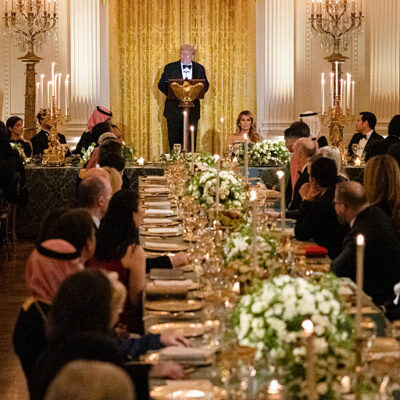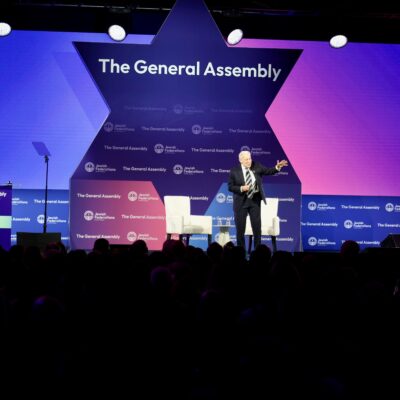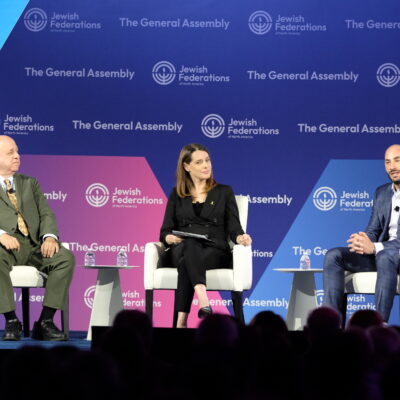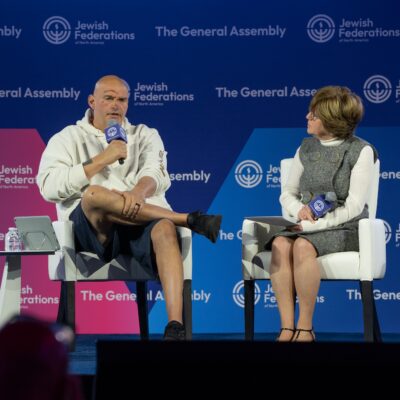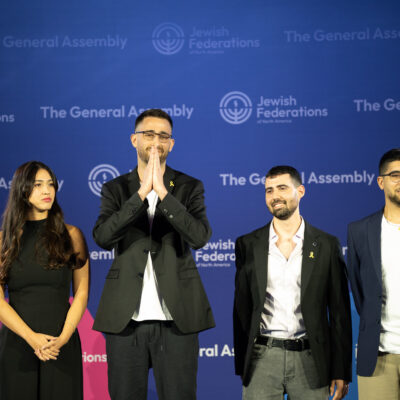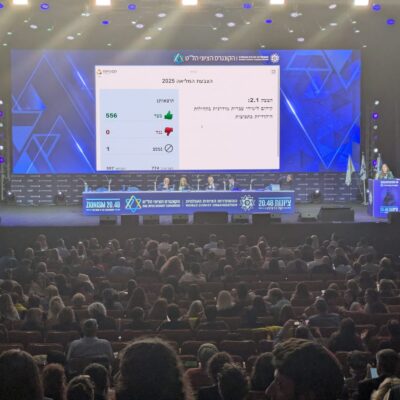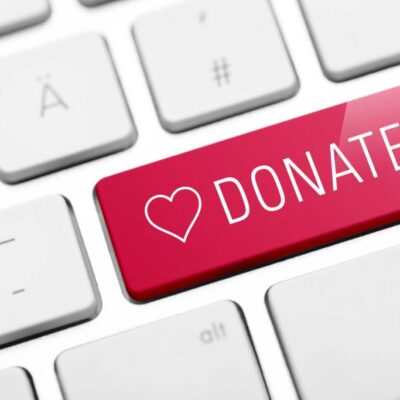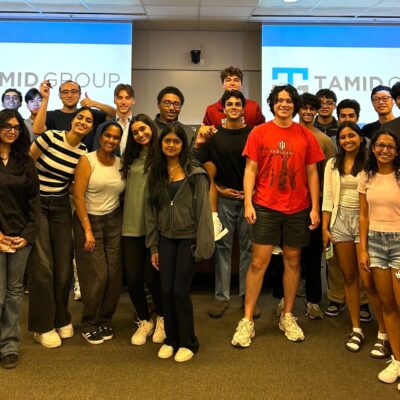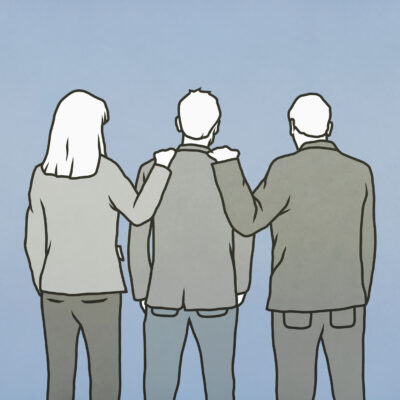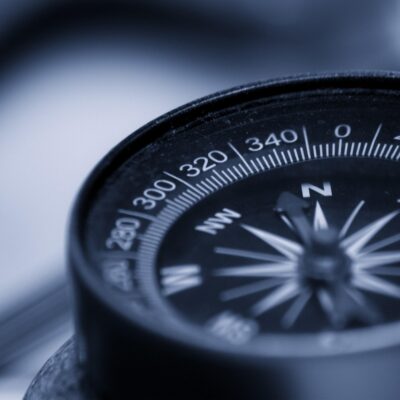Opinion
SOMEWHERE WE BELONG
Reflecting on safety from a safe room
I am always trepidatious about travel. Am I heading into the unknown? What will I find when I get there? Will the flight be safe?
At the heart of these questions, I’m often asking: Will I be safe?
These concerns didn’t go away when I landed in Israel in June as part of a delegation of LGBTQ+ leaders joining the JFNA Pride Month trip. In fact, they felt even sharper. After all, I was entering a country at war.
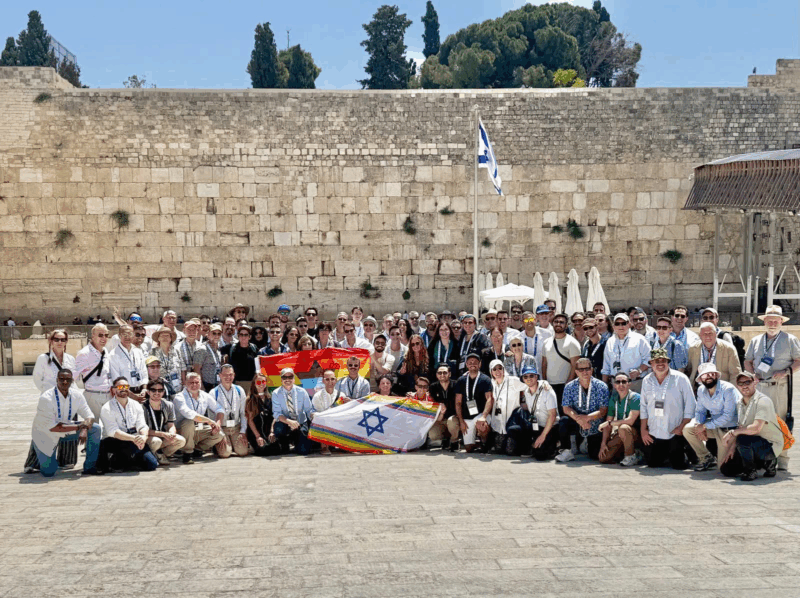
Courtesy
2025 Pride Mission to Israel visits the Western Wall in the Old City of Jerusalem.
But to my surprise, I felt a deep sense of calm almost immediately. As soon as I arrived, I began to relax into myself, shedding a layer of vigilance I didn’t realize I’d been carrying. I felt something I hadn’t felt in the U.S. for a long time: a sense of safety — and more than that, belonging.
I wasn’t alone. I belonged to a community much larger than myself where I could show up as myself. Something I heard from Kohenet Harriet Wimms at the recent JPro conference resonated: Belonging saves lives. And not just physically, but spiritually and emotionally. For me, as a queer Jew in America, that internal sense of safety has often felt tenuous. Eshel’s recent community study found that 67% of LGBTQ+ Jewish respondents who wear recognizable Jewish symbols report experiencing antisemitism daily or frequently — and I am no exception. I’ve carried the weight of having to explain myself, defend my identity, apologize for simply being who I am.
Our study also found that, due to rising antisemitism, LGBTQ+ Jews feel as though they are being pushed out of once safe queer spaces, such as LGBTQ+ community centers, bars and clubs, and are leaning on online and in-person Jewish spaces for support. Fifty-eight percent of respondents said they are no longer frequenting once-safe LGBTQ+ spaces, and 48% are increasing participation in Jewish spaces. Many respondents added comments like, “I have sought out Jewish and Jewish LGBTQ+ events and spaces more and more. I no longer engage in LGBTQ+ communities that are not Jewish,” and “It used to be that I felt most comfortable in queer spaces but now I feel most comfortable in Jewish spaces.”
In addition to feeling unwelcome in queer spaces amid rising antisemitism, LGBTQ+ Orthodox Jews — and their families — often face discrimination from the very communities that nurtured them. For them it’s a double threat of exclusion from once-safe queer spaces and from their own communities. Caught between exclusion from both secular and religious spaces, many are left feeling deeply isolated.
That burden of exclusion and alienation eased in Israel. I could breathe. I didn’t have to explain or justify my Judaism — not my observance, not my queerness, not my presence. I could simply be. Even as a queer Orthodox Jew, I was safe. I was seen.
The feeling of safety stayed with me even when my one-week trip unexpectedly turned into 17 days, many of them spent in and out of mamadim (“safe rooms”) during airstrikes as Israel began a war on another front with Iran.
And I found myself reflecting: What does it mean to have a deep sense of feeling safe while in the midst of a war, in a “safe room”? In our work at Eshel where we support and advocate for LGBTQ+ Orthodox Jews, we know there is a critical need for intentional community-building as a path to healing and connection. And now with federal mental health services on the chopping block, this need is more important than ever.
UJA-Federation of New York recognizes that this kind of safety — a sense of belonging — matters. This summer, the organization awarded Eshel, the organization I direct, with a grant specifically to address belonging and safety.
Both of us recognize that being safe means more than just surviving. It means knowing that you belong and that you’re being held in community no matter where you stand. That kind of safety isn’t born of policy or walls — it comes from community. It comes from being surrounded by people who are equally concerned for one another’s well-being.
There are many layers to reach safety. Some are internal (our emotional and psychological security) and others are external (our physical safety, our freedom from violence or other harm). Ideally, we get to have all of these layers of safety at once; but life doesn’t always cooperate, unfolding in ways we cannot control. If we’re lucky, we get to hold onto at least one layer, one dimension of safety, even when the others are stripped away.
For instance, in Israel, bombs were dropping literally around me. I was in actual physical danger. But that was not how I felt. In the safe room, I was with my family; and in the streets, I was surrounded by others with shared purpose, shared pain and shared hope. Alternatively, one can be in a crowd with no actual threat of physical danger and still feel like you may not make it out alive.
The UJA grant is directed toward meeting this critical need and is for the sole purpose of creating a community for LGBTQ+ Orthodox Jews in the New York area. It will help fund a new program director to launch monthly Jewish text study groups, Shabbat dinners and topical workshops. These initiatives, which will serve as a model for nationwide programming, aim to rebuild connections to Judaism in supportive Jewish communal spaces to help the many who feel alienated after coming out, and especially since the trauma of Oct. 7, 2023.
This moment is deeply concerning, and it’s a time for Jewish, Muslim, Christian and secular organizations to step up. Thanks to UJA’s support, we can do just that.
Miryam Kabakov is co-founder and executive director of Eshel.

 Add EJP on Google
Add EJP on Google